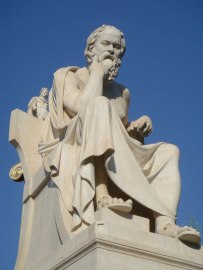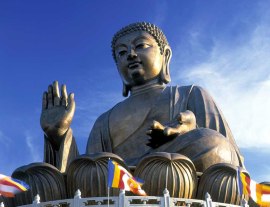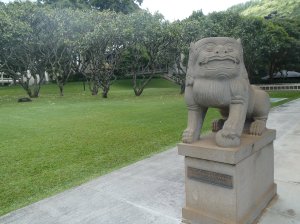
Everywhere we turn nowadays it seems there is another crisis on the horizon, a crumbling of an outdated system, or some other major predicament that we are unsure of how to address. We have incompetent leaders fueled by lust for power, greed, and promoting their own agendas, the gap between the rich and poor continues to increase, the environment continues to be subject to our negligence, more and more families are struggling financially, the majority of companies and entrepreneurs have no coherent or moral vision of ways to use their money to help others, we have a failing economy, an antiquated educational system, a breakdown in meaningful dialogue and communication, an unstable job market, and more conflicts and wars on both a local and a global scale. These are just a few examples of the issues we face today.
These are the great issues of our time, the crises of our era, the problems of our world. But what do we mean when we say phrases like that? Don’t they imply that the problems are somehow “out there”? It suggests, doesn’t it, that we the people are subject to these unfortunate circumstances, and have to learn to survive and cope with such a world, as if we are victims of others’ actions? But are these issues really separate from us? It would be an odd thing, wouldn’t it, to say that these are society’s problems or the world’s problems, yet somehow the world or society does not include myself? Now if everyone were to have this mentality, then what is left? Isn’t society is constituted by the vast network of relationships between you and me, the environment, and our neighbors across the street and across the globe? Therefore, if we wish to solve these issues, the first thing we must address is our own psychological process, for each and every one of us played a role in creating these dilemmas.
I am not blaming or trying to make anyone feel guilty, but we must understand that we are not separate from the world, from these issues. Think, if we are living a life of competition, greed, anger, violence, objectification, apathy, ignorance, envy, hatred, and self-centeredness, could the world be any different? The world is a projection of ourselves; we are as we mind. The way in which we conduct our mind, that is, our way of minding in the world, is the world. So, if we want any hope of creating a coherent and moral vision of how we can creatively respond to these issues, we will have to pay very close attention to the way we are conducting our minds.
Now, if you believe this is our human nature and we cannot change but through another, or you believe we cannot change how we conduct our mind, or you have any answer to this question without truly seeing any of this for yourself, then there is no communication between us. If you wish to live a life of competition, misery, violence, suffering and the rest of it…it is your life, not mine. But for those of us truly interested to see if there is a different way we can conduct our mind, who are open to the possibility that perhaps we can understand our psychological process and thereby change ourselves, then let us inquire together regarding this connection between ourselves and the world.
Firstly, we should recognize the fact that when we attribute the problems of our world to some external factor, we are deferring our responsibility to another. When we do that, we separate ourselves from the problem. This leads to apathy and inaction, because now you believe that someone else is tasked with the mission of solving such problems. We turn to our leaders to solve wars, end poverty, change education, and the like, yet we ourselves in our own lives continue to be violent, greedy, and surrender the responsibility of educating our children to another. First and foremost, we must recognize that we ourselves are responsible for these problems, but instead of feeling guilty and powerless, we must also see that we also have the power to become aware of this way of minding and change it. While this realization may be distressing at first, it is also very empowering.
By ((transforming)) our /ego-centric and self-centered/ mindset and ((evolving)) to a way of ((minding)) that is guided by compassion, love, wisdom, intelligence, understanding, dialogue, and free of fear, we affect the network of relationships around us. This doesn’t mean one goes out to convert others or impose one’s ideas on another, that is still violence. Do you see why it is violent? You cannot accept the way I am living, my views or religion or whatever else, and you believe you are right, that you have the “truth”; so you impose your ideas in an attempt to make me a copier of your beliefs, a second-hand, mechanical human being living on your words. No, the change that happens to others when you are free of fear and transform your way of minding is different. Others feel your presence is safe and loving. If they are at all open and aware, they will begin to feel as though you are different, and it may spark something in them.
If we care at all about these issues, and are serious about being open and changing ourselves to make the world a more peaceful, compassionate place for ourselves and future generations, then we must start with becoming aware of ourselves, our psychological process. For more on this, I recommend reading my previous posts:
On Relationships:
https://jasonkunen.wordpress.com/2013/10/29/on-relationships-encountering-others-in-the-moment/
and On Psychological Freedom:
https://jasonkunen.wordpress.com/2013/11/20/on-freedom-reaction-vs-response/
This awareness of ourselves and our reactions must extend to our relationships with others, not be confined to a cave in the mountains. Society is the vast network of relationships, and how we conduct our mind affects our relationships thereby affecting the society. Therefore, solving the problems in our world means addressing them within ourselves. If we know how to look at the violence, anger, loneliness, suffering, pain, and the rest of it within ourselves, without judging or condemning it, but observing to understand it, then we can begin to understand others and work to solve these great issues. Once we realize that we have a responsibility to humankind, to the planet, and to ourselves, we take the first step towards ((transformation)) through ((Self-knowledge)).
I also recommend reading the book Navigating the Mazeway: Fulfilling our Best Possibilities As Individuals and As a Society, by my good friend and colleague Tony Parrotto. His valuable work and accessible terminology has influenced my own ideas and language. A link to the book and the his website, The Mazeway Project are below:
Link to the Mazeway Project website: http://mazeway.org
Link to the book, Navigating the Mazeway:
http://www.amazon.com/Navigating-Mazeway-Fulfilling-Possibilities-Individuals/dp/0874260701
My teacher, Ashok Gangadean, has also been instrumental in shaping my ideas, and I have included a video of him speaking below. His website is: http://awakeningmind.org
Related links:
Global Philosophy, talk by Ashok Gangadean:
https://www.youtube.com/watch?v=ODCfj0rV6DY
Changing Education Paradigms, by Sir Ken Robinson:
https://www.youtube.com/watch?v=zDZFcDGpL4U
On Philosophy for Children, by Thomas Jackson:
https://www.youtube.com/watch?v=tNX_SvkrzjA
Listen to yourself and find answers, by Jiddu Krishnamurti:
https://www.youtube.com/watch?v=9VWnf9OBpQA
On Destiny, Meaning, Purpose and Fear Part 1:
https://jasonkunen.wordpress.com/2013/11/06/on-destiny-meaning-purpose-and-fear-part-1/
Part 2: https://jasonkunen.wordpress.com/2013/11/13/on-destiny-meaning-purpose-and-fear-part-2/
On Education: https://jasonkunen.wordpress.com/2013/10/14/reflection-on-education-10142013/
On Dialogue and Education:
https://jasonkunen.wordpress.com/2013/10/17/reflections-on-dialogue-and-education-10162013/
Link to my book, Meditations on Zen and Martial Arts Philosophy:
http://www.amazon.com/Meditations-Zen-Martial-Arts-Philosophy/dp/1105797317





